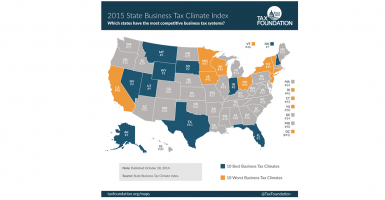The choice of where to locate a business depends upon several factors. One of the most important elements of a favorable business environment is good tax policy. Companies owe it to their investors, workers and customers to maximize after-tax income. Consequently, businesses tend to migrate to those areas where tax policies are least punishing, bringing with them jobs, investment and economic growth.
Earlier this week the non-partisan Tax Foundation released its 2015 State Business Tax Climate Index, an annual listing that ranks U.S. states based on how welcoming their tax laws are to businesses. The study evaluates the impacts of each state’s policies across five major tax categories: individual and corporate income taxes, sales taxes, property taxes and unemployment insurance taxes. Each state’s composite score reflects how well each system conforms to the key components of sound tax policy–low rates and broad bases.
Where does your state stand? The results are shown in the map above. Wyoming claimed the top spot for the fourth straight year, with South Dakota, Nevada, Alaska and Florida rounding out the top five best business tax climates. What was responsible for the high rankings in these states? In general, it was the absence of one of the major taxes. None of these states have individual income taxes, and the top three scorers additionally have no corporate income tax.
New Jersey scored the worst, followed by New York, California, Minnesota and Vermont. These states suffer from complex tax codes that impose high rates and economic distortions.
The award for most improved goes to North Carolina- which moved from 44th place to 16th. Major tax reform legislation in 2013–which restructured a multi-bracketed system with a top rate of 7.75 percent to a single-bracketed system with a top rate of 5.8 percent, and also brought down corporate rates–was primarily responsible for the dramatic jump.
While other factors are certainly important, lower tax burdens generally foster economic growth and wealth creation by attracting new businesses and, by extension, investment capital and jobs. Evidence shows that states at the top of the business tax climate index experience higher economic growth and lower average unemployment than states at the bottom. In order to make our businesses more competitive and keep jobs and investment on American soil, President Obama and Congress should follow North Carolina’s example by simplifying our federal tax code and cutting corporate rates.
































